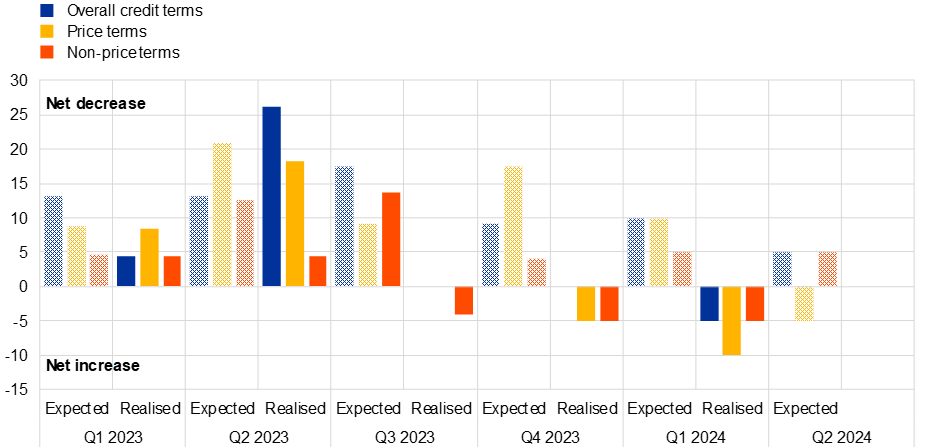Results of the March 2024 Survey on credit terms and conditions in euro-denominated securities financing and over-the-counter derivatives markets (SESFOD)
- PRESS RELEASE
Results of the March 2024 Survey on credit terms and conditions in euro-denominated securities financing and over-the-counter derivatives markets (SESFOD)
12 April 2024
- Credit terms and conditions ease over the period from December 2023 to February 2024
- Increases in the maximum amount of funding, the maximum maturity of funding and demand for funding across many types of collateral
- Increased resources dedicated to managing concentrated credit exposures to banks and dealers
Overall credit terms and conditions eased for most counterparty types between December 2023 and February 2024, an outcome which contrasted with the expectations of further tightening that had been expressed in the December 2023 survey. Price terms eased more than non-price terms overall. Respondents mainly attributed the easing of price terms to an improvement in general market liquidity and improvements in the current or expected financial strength of counterparties. Small net percentages of survey respondents expected price terms to ease further over the period from March to May 2024 and expected non-price terms to tighten again over the same period. A small share of respondents reported that changes to the practices of central counterparties, including as regards margin requirements and haircuts, had contributed somewhat to an easing of price and non-price terms.
Chart 1
Realised and expected quarterly changes in overall credit terms and price/non-price terms offered to counterparties across all transaction types
(Q1 2023 to Q2 2024; net percentages of survey respondents)

Source: ECB.
Note: Net percentages are calculated as the difference between the percentage of respondents reporting “tightened somewhat” or “tightened considerably” and the percentage reporting “eased somewhat” or “eased considerably”.
The amount of resources dedicated to managing concentrated credit exposures increased over the review period, especially as regards exposures to banks and dealers. The use of financial leverage declined somewhat over the review period. Respondents reported increases in the intensity of efforts to negotiate more favourable terms for all counterparty types. They also reported declines in the volume, duration and persistence of valuation disputes disputes at the level of individual counterparty types.
Turning to financing conditions for the various types of collateral, many collateral types saw significant percentages of respondents report increases in the maximum amount and the maximum maturity of funding. Increased haircuts were applied to convertible securities – and, to a lesser extent, equities, high-quality corporate bonds and covered bonds. Financing rates/spreads increased for funding secured against all types of collateral except covered bonds, with the most significant increases being observed for funding secured against government bonds, equities and convertible securities. Many collateral types also saw significant percentages of respondents report increases in overall demand for funding and demand for funding with a maturity greater than 30 days – particularly government bonds, high-quality corporate bonds, covered bonds and equities. Respondents reported mixed results as regards the liquidity and functioning of collateral markets. The volume, duration and persistence of valuation disputes declined somewhat for individual collateral types.
Looking at credit terms and conditions for the various types of non-centrally cleared OTC derivative, initial margin requirements increased slightly for all derivative types. Survey respondents reported mostly unchanged conditions as regards the maximum amount of exposure and the maximum maturity of trades. Respondents reported improved liquidity and trading conditions for foreign exchange, interest rate and equity derivatives. Moreover, they reported that the volume of valuation disputes had declined for all derivative types except credit derivatives. Finally, they did not report any changes in new or renegotiated master agreements or changes as regards the posting of non-standard collateral over the review period.
The ECB included a number of special questions in the March 2024 survey in order to look at longer-term trends. The survey asked respondents to compare credit terms and conditions on the cut-off date for the March 2024 survey round (i.e. at the end of February 2024) with those reported in the March 2023 survey. Compared with the previous year, overall terms and conditions for securities financing and OTC derivatives transactions had eased somewhat across all counterparties, while credit standards for funding secured against various types of collateral and non-price terms in OTC derivatives markets were generally tighter.
The results of the March 2024 SESFOD survey, the underlying detailed data series and the SESFOD guidelines are available on the ECB’s website, together with all other SESFOD publications.
The SESFOD survey is conducted four times a year and covers changes in credit terms and conditions over three-month reference periods ending in February, May, August and November. The March 2024 survey collected qualitative information on changes between December 2023 and February 2024. The results are based on the responses received from a panel of 26 large banks, comprising 14 euro area banks and 12 banks with head offices outside the euro area.
For media queries, please contact Verena Reith, tel.: +49 172 1773008.
European Central Bank
Directorate General Communications
- Sonnemannstrasse 20
- 60314 Frankfurt am Main, Germany
- +49 69 1344 7455
- media@ecb.europa.eu
Reproduction is permitted provided that the source is acknowledged.
Media contacts